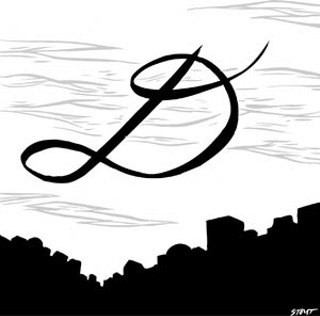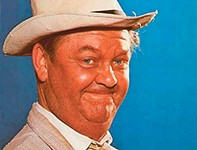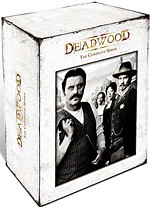Letters at 3AM
Deadwood in the morning
By Michael Ventura, Fri., June 24, 2005

Wild Bill Hickok had elegant penmanship. His was an era when "a good hand" was expected, but Hickok's was exceptionally graceful, and his lines on unlined paper were perfectly straight. It was almost calligraphy. How and why did an unruly Illinois farm boy, dismissed by his father early on as a "dreamer," who'd lead a violent life almost all his life – how and why did he learn to value painstaking, gorgeous aesthetics in his handwriting? The reason is lost to history. Everyone knows the cards he held when he was murdered in Deadwood in 1876 at the age of 38: aces and eights. Ever since they've called that a "dead man's hand." (Some gamblers, superstitious to the core, fold that hand even when it may win.) And is there anyone within a mile of a TV who hasn't heard of Wild Bill? Eyewitnesses testify he was an incredible marksman with a handgun. Long before he died, his exploits were trumpeted (often invented) far and wide. But there's nothing in the legend of Wild Bill to tell why he took such care to make his letters lovely.
No hesitation in that hand – the letters swirl and swoop, full here, thin there, exact. An aesthetic sense! Almost effete, in a kind of manly way. We know his killings, weaknesses, excesses – but how this sensibility of beauty lived in him, we'll never know.
Calamity Jane, at least as wild as Bill, gives a clue in her diaries: "We both lived a life of lies."
Was the lie to be found in the difference between – or the nexus connecting – what they did, what they were said to have done, and what they felt?
Feelings and the inner life weren't what these people wrote about. It was considered unseemly, in their time, to express private feelings verbally, much less in writing. But they did write: Hickok's letters, Jane's diaries, the autobiography of John Wesley Hardin, the many writings of Bat Masterson and Wyatt Earp, and Seth Bullock's record of founding Deadwood. The movies don't portray them as people who might write. Their intellects are not so much dismissed as never considered. But they wrote. These were complicated people.
It's morning in Deadwood at the Adams Museum. I'm reading Wild Bill's last letter in a glass case, thinking, "Just who the hell were you, Wild Bill? That kind of penmanship doesn't happen by accident." The letter was written to his wife (a former trapeze artist 10 years his senior) on the day he died. He wrote it, then went to a card game at Saloon Number 10, a few blocks from here, and sat with his back to the door. I don't sit with my back to the door. People who've lived with danger rarely do. We like to see what's coming and we're aware of activity at every entrance and exit. Did Wild Bill decide to be killed? But if I explore that idea, am I in danger of being censured by Seth Bullock? Seth Bullock, who wrote to chastise legend-makers, calling them "that pertinacious source of so much misinformation offensive to the real pioneer."
Seth Bullock, long overdue, has finally entered Western legend through HBO's superb series Deadwood. We owe Seth Bullock more than you might think. Born in Ontario in 1849, he left home early and was on his own in Montana by the age of 18. At age 22 he was serving in Montana's Territorial Senate; he was sheriff of Helena at 23. When 22, he introduced and guided the passage of a resolution in Montana's legislature to recommend to Congress the establishment of Yellowstone National Park. Congress approved. Conservation wasn't a 19th-century ideal. It took a cultivated aesthetic, plus a sense of history and a knack for politics, for 22-year-old Seth Bullock to envision and found Yellowstone National Park. How Bullock felt that aesthetic within himself, we'll never know. The accounts then and the legendary portrayals now give no clue. We only know that without a deep aesthetic and historical feeling for the land, there could have been no result like Yellowstone.
In 1876 Bullock and his lifelong friend Sol Star (also portrayed in Deadwood) headed to Deadwood to start a hardware business. (Star would one day be the town's mayor.) Deadwood had been founded by gold miners on Sioux land. Until Congress legalized the theft, Deadwood was technically not on U.S. territory and not bound by U.S. law. Or any law at all. Of course it was a more complicated place than any film can portray. A plaque not far from where Hickok was killed: "In the autumn of 1876 the Black Hills Pioneer reported that Deadwood had 173 businesses, including an assayer, a bank, a bath house, 3 butchers, 2 brewers, 4 billiard halls, 11 clothing houses, 21 groceries, 2 dance houses, 14 gaming houses, 2 hardware stores, 8 laundries, 7 lawyers, and 27 saloons." Al Swearengen (another Deadwood character) owned the Gem: part theatre, part brothel. (He made fantastic money for a while, but it is said that when he left town he was penniless.) Nor did Deadwood ever really go straight. Prostitution was legal, and brothels operated openly, until 1980! Gambling became legal again in 1979, and now a sign on I-90 boasts, "1400 rooms – 80 Casinos – See Historic Gunfights Daily!" (That use of the word "casinos" is a little loose. There may be 80 places to gamble, but there are only a few casinos, cozy by Vegas standards.) But old Deadwood's wildness can hardly be exaggerated. In 1878 one-third of its deaths were attributed to "violence caused by murder, suicide or accidents," though Seth Bullock wrote: "It was remarkable that with the number of outlaws of both sexes in the gulches, there were so few crimes of the graver character committed."
Bullock was 28 when he became first the sheriff of Deadwood. He would be involved in its law enforcement, politics, and commerce until his death in 1919. In 1884 he was deputy U.S. marshall. Out riding one day he happened to meet Teddy Roosevelt, who had a ranch in the Badlands; Roosevelt, in the capacity of deputy sheriff, was escorting a horse thief he'd just apprehended. Seth and "TR" remained close friends all their lives. Roosevelt sent his sons to work on Bullock's ranch to toughen them up, and he would one day mention Bullock in a State of the Union address. It's likely that the president credited with establishing our national parks system got some of his inspiration from the founder of Yellowstone.
Morning in Deadwood. It's early June but chilly, jacket-and-scarf weather. The narrow town sits in a gulch. The surrounding Black Hills are steep – and from a distance they are black, because they've burned so often. I'm staying in one of its oldest surviving buildings, the Franklin Hotel, 1903. (The original wood structures burned or were destroyed by flood.) On every room door is a plaque with the name of a famous guest, names like Seth Bullock, Teddy Roosevelt, Buffalo Bill, Potato Creek Johnny, and, on my door, Lame Deer. (Modern names too, but they don't carry the same weight.) The fixtures are antique – push-button light switches, that kind of thing. On the shelf in my room: The New Century Dictionary, a century old. There is a manually operated elevator; the very elderly gent who takes you up and down informs you that there's only about a dozen such elevators left in the country. Early in the morning in the dining room, another very old gent plays piano – "Lara's Theme." Not exactly early-morning music, but incongruity somehow suits the place.
The legends show you where to go. Once you get there, you do your best to find out why you came. Maybe I came because, as a kid in New York, Western movies were what first taught me that the world is wide and that I might roam in it. When I can, I seek out the places that gave me my first legends. Like last evening, at twilight, climbing the very steep grade to the cemetery. No one about. Chilly. Too dark already to read names on the stones. But the graves of Wild Bill Hickok and Calamity Jane, buried near each other as she'd wished when she died in 1903, are hard to miss. Difficult to keep my footing, the slope's so steep, but I clamber around and find them. And remove my hat.
"I know little about you two. Nobody really does. Just legends and incongruous facts like your penmanship, Mr. Hickok. Your diary, Ms. Jane. The books and films give scant hint of your inner lives, though I know you couldn't have lived so restlessly – couldn't have become icons of our restlessness – without an even more restless inner life. I wonder about your demons and your angels but I don't try to fill in the blanks. You lived lives that captivate people who wouldn't want to live like you or even live next door to you – enjoying your darkness the better to be certain of their light, perhaps. Maybe you'll only be forgotten when people no longer need to leave home, in this country created by home-leavers. Legends about people like you were my first clue to freedom. I guess that's why I'm here – a restless man, honoring you for doing your part to give restlessness it's good bad name. Well. Rest in peace, if there is any." ![]()










